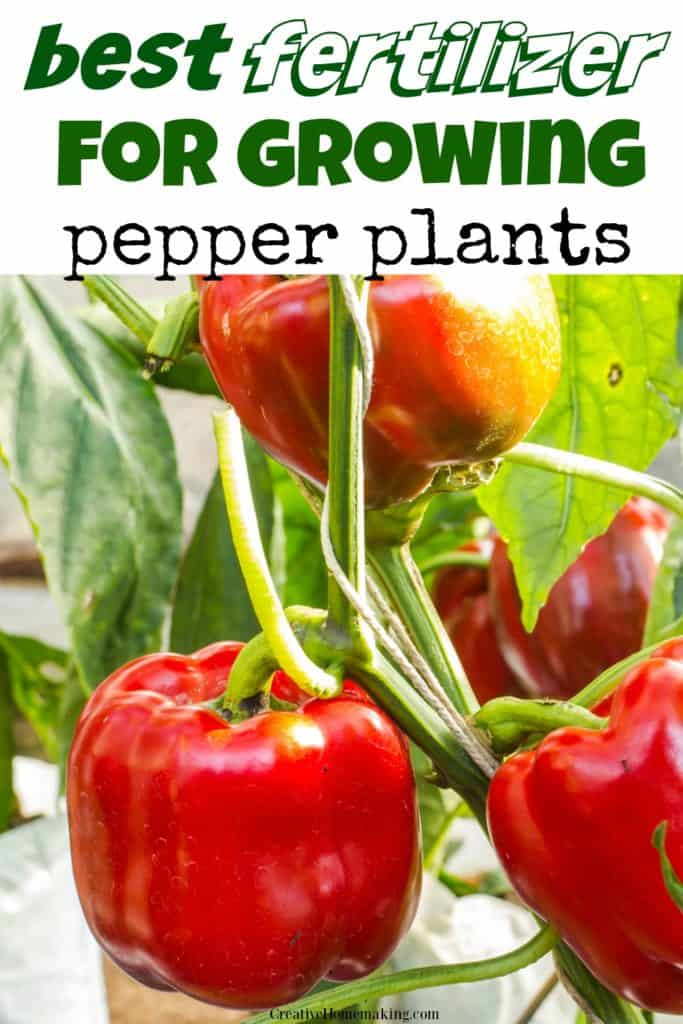Best Fertilizers for Peppers: Improve Growth and Flavor with Our Top Picks
Best Fertilizers for Peppers: Improve Growth and Flavor with Our Top Picks
Blog Article
Organic Vs. Synthetic Fertilizers: Which Is Best for Supporting Healthy And Balanced Pepper Plants?
In the world of nurturing healthy and balanced pepper plants, the selection between natural and artificial plant foods stands as a critical decision with far-ranging implications. While both alternatives objective to supply crucial nutrients to sustain plant growth, the subtleties of their effect on the dirt, plant wellness, and the setting stimulate an argument that echoes throughout the gardening neighborhood. Comprehending the distinctive benefits and potential pitfalls of each fertilizer type is critical for pepper farmers looking for to optimize their returns while maintaining an eco-conscious and lasting strategy.
Benefits of Organic Plant Foods
Organic plant foods provide a lasting and environmentally-friendly method to beneficial pepper plants, supplying vital nutrients without using synthetic chemicals. These natural fertilizers are originated from natural sources such as compost, manure, bone dish, and algae, advertising dirt health and biodiversity. Unlike artificial plant foods, organic alternatives release nutrients gradually, guaranteeing a balanced and constant supply for pepper plants to grow.
One considerable advantage of organic plant foods is their capability to improve soil framework and water retention. By improving dirt health and wellness, organic fertilizers promote useful microbial activity, which helps in nutrient uptake by pepper plants. Furthermore, organic plant foods minimize the threat of chemical run-off, shielding water resources from air pollution and protecting the environment.
Furthermore, organic plant foods add to lasting soil fertility by promoting the development of useful soil organisms. These microorganisms help break down organic matter, releasing nutrients in a type that is easily available to pepper plants. best fertilizers for peppers. By cultivating a healthy dirt community, organic plant foods support sustainable pepper growing methods that profit both plants and the setting
Drawbacks of Artificial Fertilizers
Artificial fertilizers, in contrast to their natural counterparts, position different negative aspects when made use of to nurture pepper plants, affecting both plant health and ecological sustainability. One significant downside of artificial plant foods is their propensity to seep nutrients from the soil rapidly.
Furthermore, the overuse of synthetic plant foods can contribute to water pollution. Excess plant foods not absorbed by plants can remove right into water bodies, leading to eutrophication, where algae blossoms deplete oxygen levels in the water, damaging aquatic life. Moreover, artificial fertilizers are generally stemmed from non-renewable resources, such as nonrenewable fuel sources, adding to carbon exhausts and environmental destruction throughout their production.
Nutrient Absorption Contrast
When comparing artificial and natural fertilizers in terms of nutrient absorption, organic plant hop over to here foods have the benefit of providing a much more well balanced and slow-release resource of nutrients. Organic plant foods have a variety of macro and micronutrients that are not only helpful for the plants yet additionally promote healthy soil microbial activity, which aids in nutrient uptake.
Additionally, organic plant foods improve dirt framework and water retention ability, permitting pepper plants to access nutrients more efficiently. This improved soil quality helps with root advancement, allowing much better nutrient absorption. Synthetic fertilizers, although at first improving plant growth because of their high nutrient focus, may hinder long-term nutrient absorption by degrading dirt health and wellness gradually.
Environmental Effect Considerations

On the other hand, synthetic plant foods, although commonly more focused and promptly offered to plants, can have detrimental results on the atmosphere otherwise used properly (best fertilizers for peppers). Their manufacturing requires high power inputs, resulting in greenhouse gas emissions and adding to climate adjustment. Moreover, the runoff of excess artificial plant foods can contaminate water sources, leading to eutrophication and damaging water ecosystems.
Best Plant Food Practices for Peppers
When fertilizing pepper plants, enhancing nutrient uptake and decreasing environmental impact are crucial factors to consider. To achieve this, it is necessary to adhere to best fertilizer methods tailored to the particular requirements of pepper plants. One crucial practice is to carry out a soil examination prior to using any kind of plant foods. This examination can determine the pH level of the soil and recognize any nutrient deficiencies, directing you in choosing one of the most appropriate plant food formula.
One more crucial method is to fertilize pepper plants at the best time. Generally, peppers benefit from receiving fertilizer at growing and Get the facts after that once again when they start to flower. Over-fertilizing can lead to nutrient inequalities and damage the plants, so it is crucial to comply with recommended application rates.
Furthermore, choosing a well balanced fertilizer with an NPK ratio that suits pepper plants' demands is fundamental. Eventually, combining synthetic and natural fertilizers deliberately can assist support healthy pepper plants while lessening environmental impact.
Verdict

Organic fertilizers supply a sustainable and environmentally-friendly strategy to nourishing pepper plants, giving important nutrients without the usage of artificial chemicals. Unlike synthetic plant foods, natural options release nutrients gradually, ensuring a consistent and well balanced supply for pepper plants to prosper.
Artificial fertilizers, in contrast to their organic equivalents, posture various drawbacks when utilized to nurture pepper plants, impacting both plant health and environmental sustainability. When comparing natural and artificial fertilizers in terms of nutrient absorption, organic fertilizers have the advantage of offering a much more well balanced and slow-release resource of nutrients.In addition, natural plant foods enhance soil structure and water retention capacity, allowing pepper plants to gain access to nutrients a lot more effectively.
Report this page